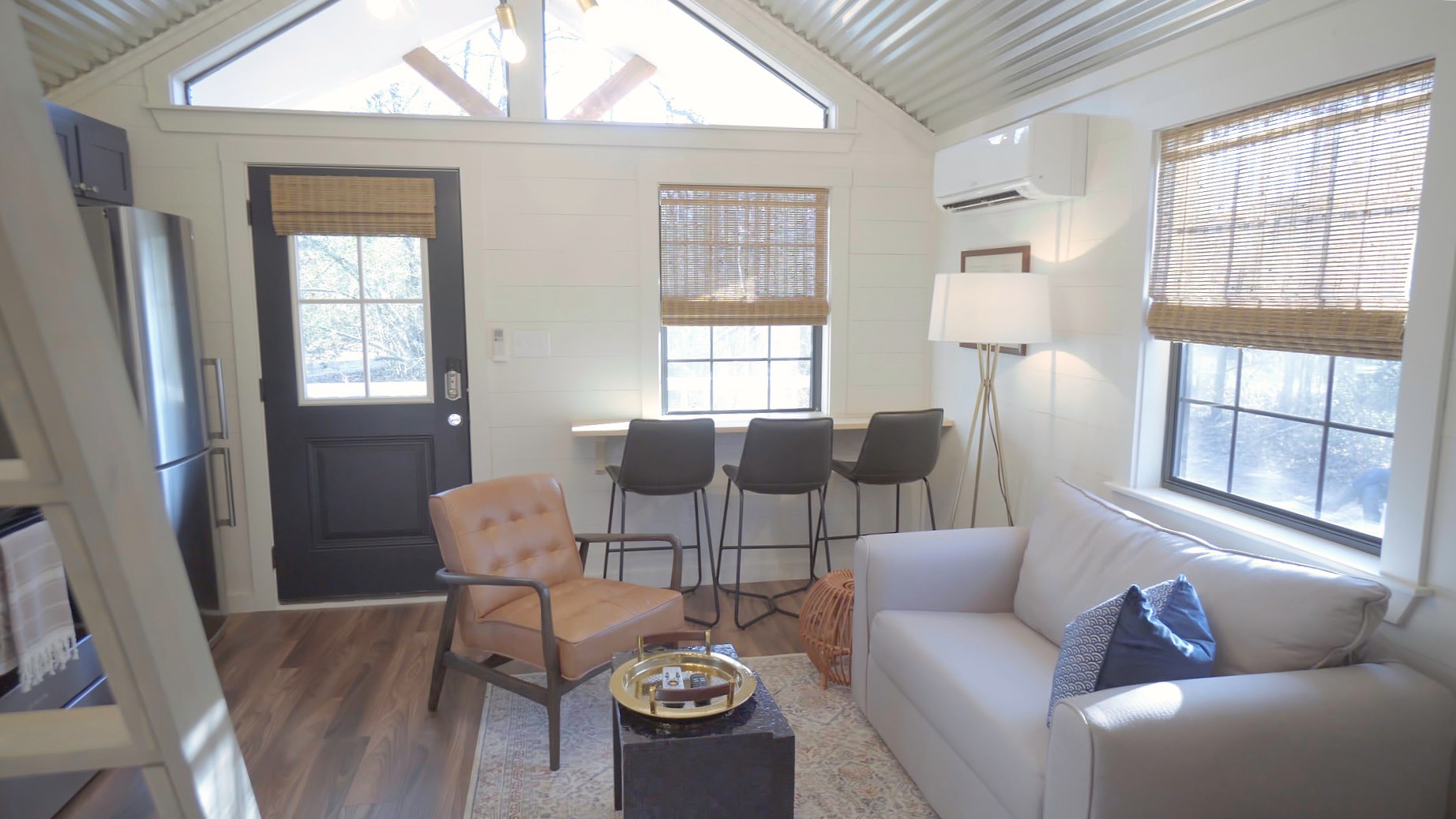ADU’s for living spaces, in-law suite, backyard rentals and more!
When it comes to livable spaces options for your property, either to use as a rental cabin, in-law suite, backyard rental, solution to housing aging relatives on your property or helping out college students with an affordable living space, then an accessory dwelling unit may be the perfect solution for you.
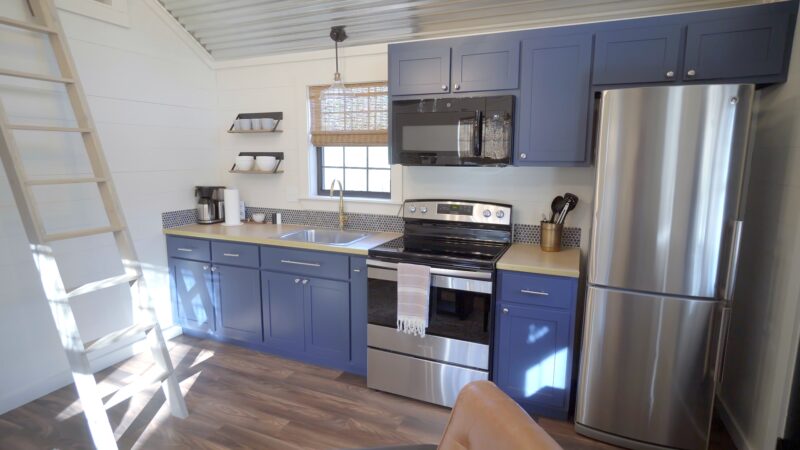

Current market trends are driving savvy homeowners to look for affordable housing for family members, rental income or passive income, a long term rental unit for friends, or to even up the resale value of their primary home.
If done correctly, an ADU will add to your property value. Many municipalities, especially in California, or other areas where housing demand has outpaced actual housing, encourage ADU use for a living area.
Be sure to check into your local regulations or state regulations to ensure the ADUs you are looking at or considering are built to building code standards for your location, and meet size requirements for your tiny house or backyard ADU project.
Is an ADU a good idea?
A Porch Survey from 2020 found the median resold value increases in homes with the ADU at 45% versus houses without ADUs. ADU’s have proven themselves as an excellent way to earn passive income in the long term!
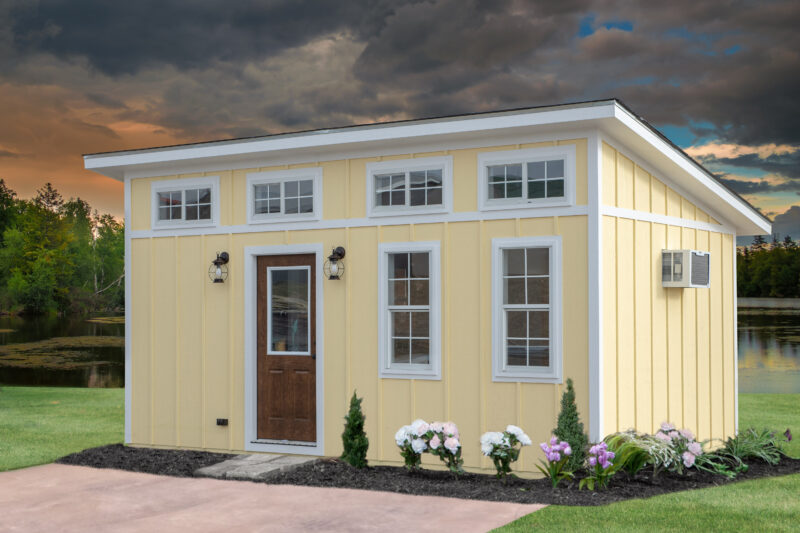

What is an Accessory Dwelling Unit?
Zoning laws classify Accessory Dwelling units as legal, habitable living spaces built to residential codes, that are added to an existing property that already has a home on the property.
Unlike ‘shed to home’, the term ADU is a legal housing classification. Each state, county and city then adopts codes that define within their certain jurisdiction, what the allowances are.
All legal ADU’s (Accessory Dwelling Units) are built to residential code, however, there is a vast difference between the size allowance per area.
Some areas classify them as under 500 square feet, and other areas have a formula based on the existing dwelling, and others are under 1,100 square feet. Be sure to follow up with your local area for specifications. This is an easy google search or phone call.
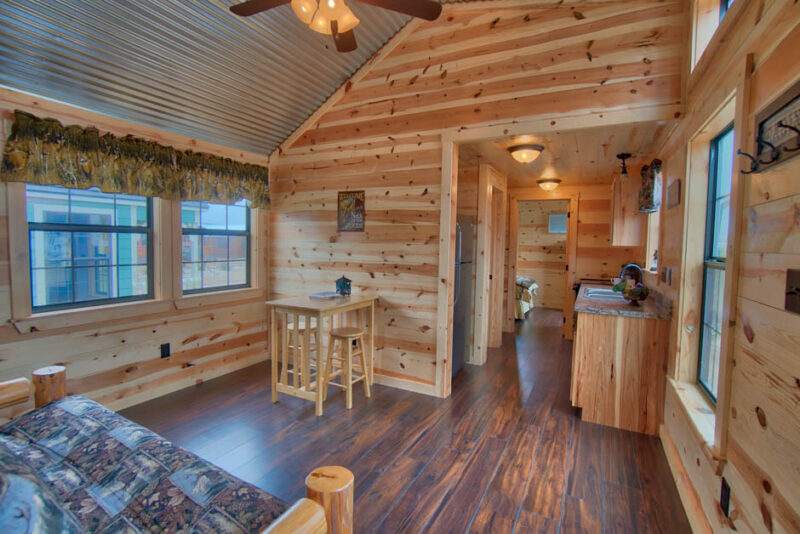

Accessory Dwelling Units (ADU’s) can be built on site, or factory built ADUs
Accessory Dwelling Units (ADU’s) can be built on site, or factory built, and delivered to your property. If you choose an ADU that is a factory built ADU, double check your local codes, your area will more than likely require a modular certification or, if you live in a HUD zoned area, a HUD labeled unit could qualify as well.
Most cities or areas will require some sort of proof that your factory built Accessory dwelling units (ADU) is built to the standards set forth in building codes, so a modular certification label or a HUD label proves the unit is built to the perspective codes allowed with Modular (Residential, IRC Codes) or HUD Codes.
Site built ADUs will have more flexibility in what can be built for your ADU, but the time to build is longer than a factory built ADU. Stick built adus – also known as site built adus are completely built and assembled on site.
This construction method offers limitless possibilities for families wanting to match an existing house with stone, brick, or other masonry options that are not available on a factory built adu. Sometimes this is the easiest method when working through regulatory barriers established by many communities.
Factory built ADUs have less flexibility in what can be built, due to having to transport from a factory to your property, and getting it on your property, however, the lead time is much shorter than site build ADUs and prices are usually less than a site built ADU.
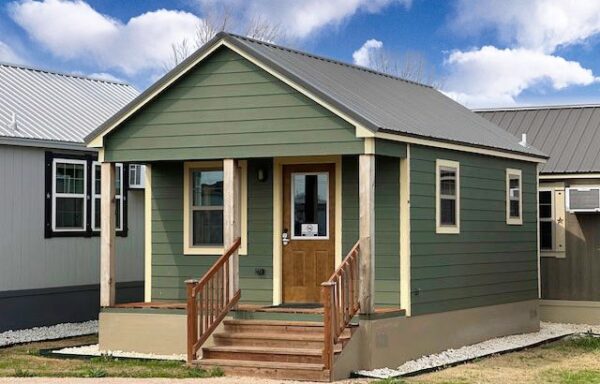

What is a factory built accessory dwelling unit (ADU)?
Factory built ADUs are accessory dwelling units adus built offsite in a factory.
Modular prefab ADUs have become more widespread — it’s the most common source of obtaining an affordable ADU. All the components arrive on the site in a fully assembled unit which is either lifted by crane or mounted on the site. Many modular prefab ADU manufacturers offer studios one or two bedroom ADUs.
Modular prefab builders usually provide multiple types of flooring, roofing, exterior cladding, and various finish options to choose from to customize your living space. Modular homes offer the same real property value as your existing structure.
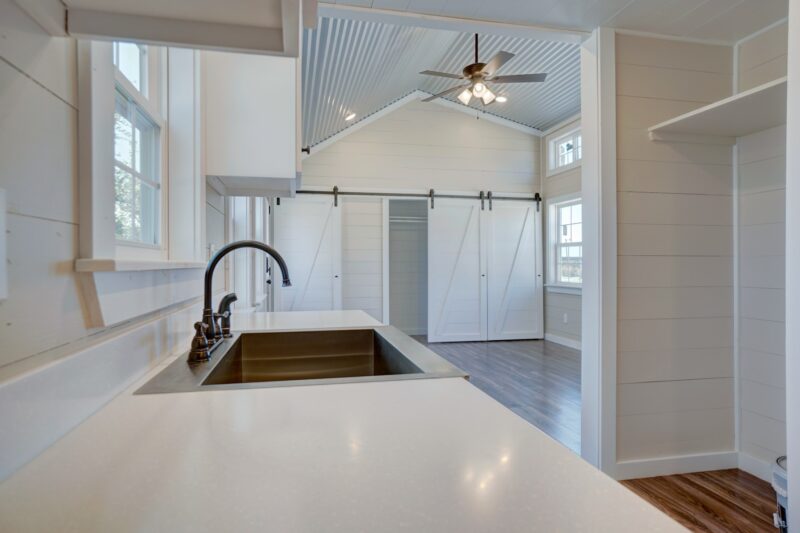

Are Accessory Dwelling units a form of legal housing?
Yes! ADUs are a legal form of housing, identified in residential codes, and a great source for extra income. As long as you follow the state requirements on the building or purchasing of your ADU, then you have a legal form of housing. Most states recognize that ADUs help to address the affordable housing crisis.
Are accessory dwelling units tiny houses?
Most definitely. ADUs are smaller than the primary resident, and are tiny. These tiny houses would be considered stationary tiny houses.
ADU’s are perfect Stationary Tiny Houses!
Stationary tiny houses offer more flexibility in building options and the peace of mind that these are truly built to certified residential codes, unlike tiny homes on wheels.
With this compact space-saving prefab cabin option, you can pick out all your perfect touches from the custom cabinets to the flooring.
Stationary tiny homes provide much more design flexibility when compared to tiny homes on wheels so that everybody can maintain their desired level of privacy in this compact prefab tiny home cabin.
With your ADU series cabin, you do not have to sacrifice quality and craftsmanship to obtain your new affordable housing tiny home cabin!
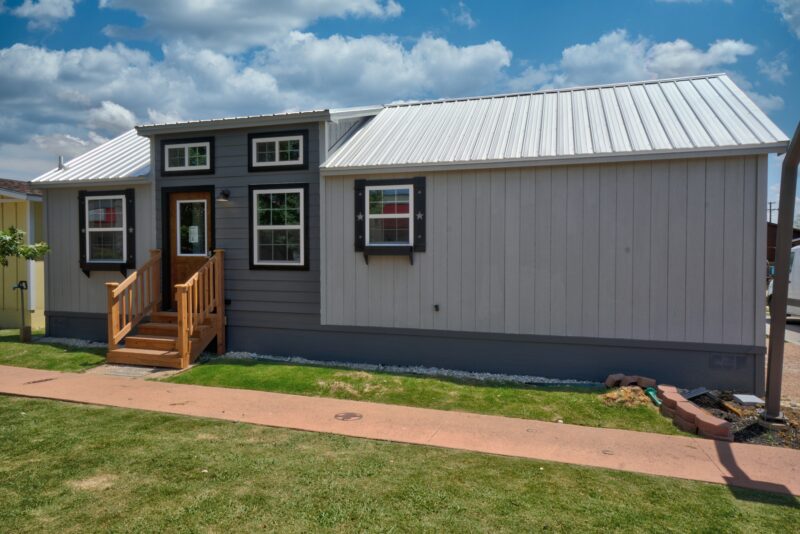

Can accessory dwelling units be handicap accessible?
Even though Accessory Dwelling Units are small in size, they can still be handicap accessible just like single family homes. With families caring for elderly parents, your back yard house ADU can be equipped with handicap accessible features for housing aging relatives, so ensuring you are creating a safe, and easy to move around in living space is important.
Check with the factory prefab ADU builder, site builder, or ADU Cabin builder for a handicap accessible plan for your ADU. Items that would be included are grab bars for the bathroom, proper turning radiuses in areas to accommodate wheelchairs, and handicap accessible vanities and sinks.
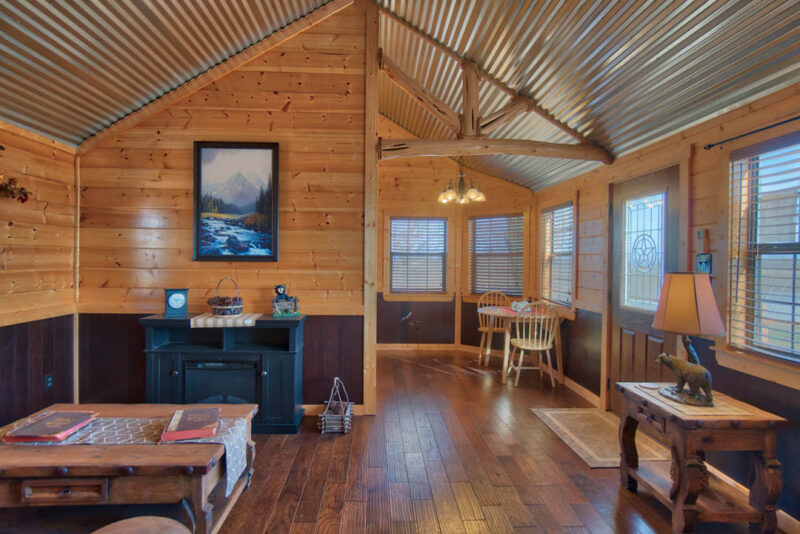

Is a finished out shed considered an accessory dwelling unit?
If you google ‘shed to home’ or ‘finished out shed’, ‘shed to tiny home’, you will find thousands of videos, pictures and blogs on ways to turn an affordable storage building into a living space. Homeowners are looking towards this as an alternative source for stick built – also referred to as site built by building code – adus to complement their main house.
This trendy option is even supported by shed companies and shed dealers who advertise storage buildings as living spaces. Attractive offers include rent to own, and completion in just a few weeks, as these are built indoors.
2 Items to check on when looking at a prefab ‘shed to home’ possibility for your ADU
Before you invest your money, check out a two of key points, and if you can check off a ‘YES’ on each of these, then it would be a good, and legal option.
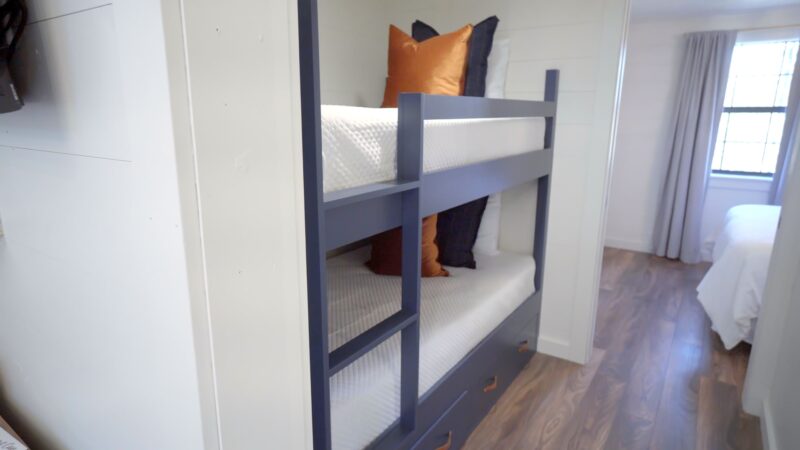

1) Is the storage building or shed you are looking at framed and built to residential codes adopted by the state you live in?
If yes, great, if no, then locate a builder who does, its not worth the risk or possible fines or removal request from your local building official. Pretty much all states have adopted building minimum standards for ADU’s (accessory dwelling units), its easy to locate the requirements with a quick google search to your county, city or state.
An ADU is considered a living space, so it does need to meet the minimum requirements that have been determined for a safe living space.
If you are using this living space for your relative, college student, or renters, do not sacrifice quality based on what tiktok or a salesperson advertises, do a bit of research so you are prepared with questions when you go to purchase a factory built accessory dwelling unit.
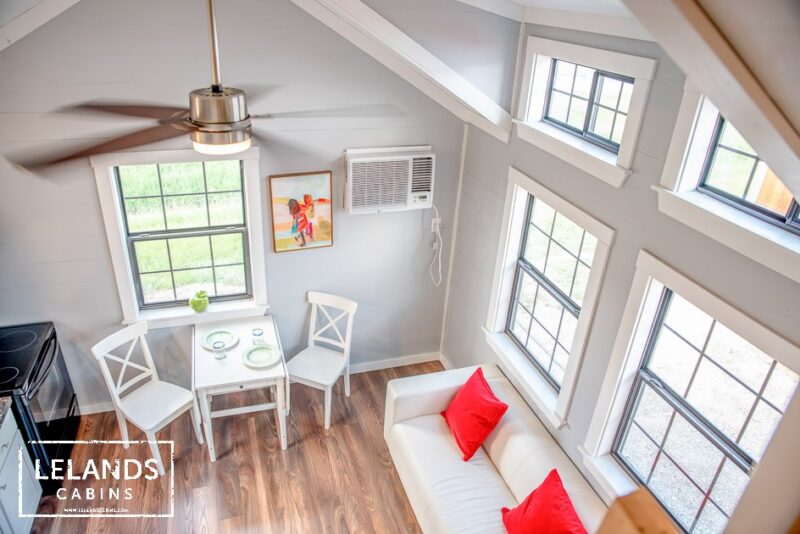

2)Can the builder tell you what codes the prefab building you are looking at for your adu is built to?
Each state adopts codes to build by, and HUD builders follow set HUD codes, this simple question should lead to a quick answer from the salesman of what exact codes are being followed, and be able to point out highlights to look at to ensure this is true.
All buildings that will be used for a living space are required to be built to code. If your builder is a HUD builder, then HUD codes are followed, and the building will be on a chasis. HUD adus are built buy manufactured home builders.
If your builder is a certified modular builder, then the living space will be built to International Residential Codes (IRC) for you area. Modular builders build prefab adus and deliver to your property.
If your builder is a cabin builder, check and make sure they are a certified modular cabin builder building to IRC codes, if not, find a builder who does! Even if you are looking at a ADU shell, or cabin shell, it needs to follow building codes.
Are you going to trust your investment to a company that does not build to code?
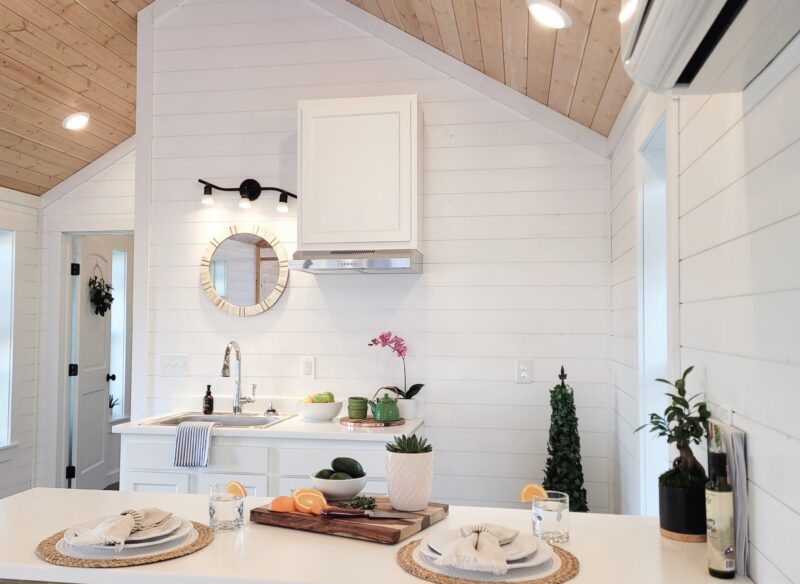

How to check to see if the prefab builder I am considering is the right builder to use.
This one is super simple to find out, simply ask your factory direct cabin builder, adu builder or shed builder advertising living spaces, if they are a registered builder, you can also go direct to the state you live in and ask.
States are a bit more picky when it comes to factory built living spaces, as they want to ensure the integrity of the building. If the company you are looking at is registered as modular or HUD with your state, then you are on the right track!
Again, check and see what your area is zoned for your adu – if factory built adu, do you need modular certified or HUD certified
Floor plan guide – 4 Highly Optimized, compact factory built ADU’s
Given the nature of the smaller footprint of an ADU compared to the primary home on the property, floorplan optimization is key.
Check out these 4 Optimized floor plans from the floor plan guide at Leland’s Cabins, America’s premier cabin builder. These are prefab cabin adu’s that are built in a factory and delivered to your property.
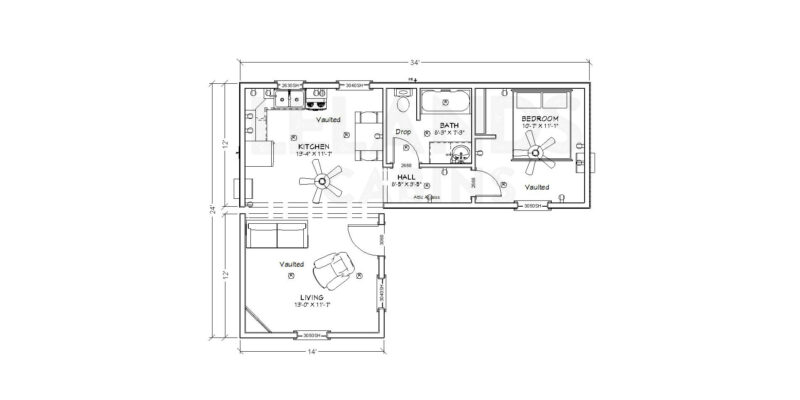

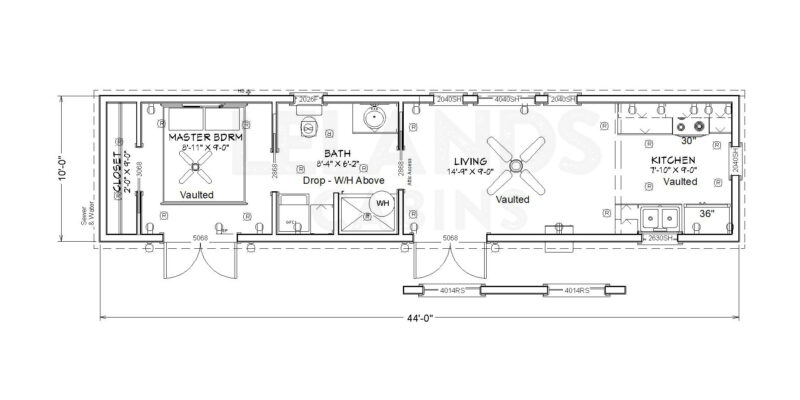

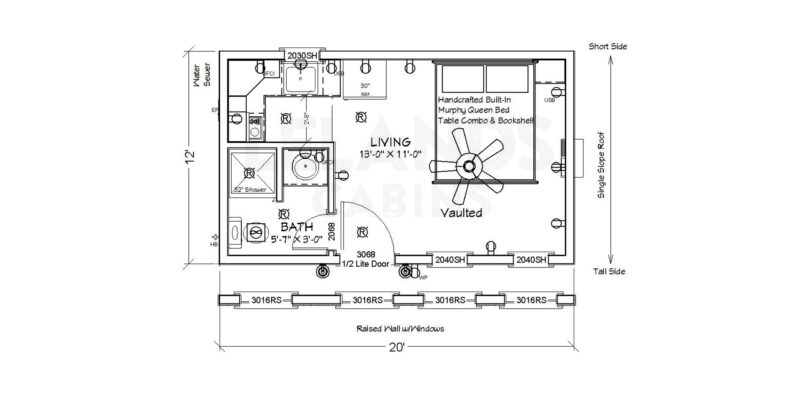

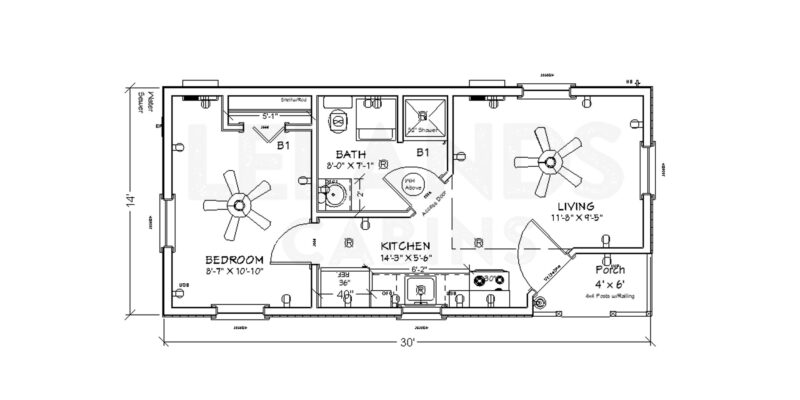

Where can Leland’s Cabins deliver Factory built ADU’s (accessory dwelling units)?
At Leland’s Cabins, ADU prefab cabin series are built in our Texas and Kentucky factories and are perfectly compact! These certified modular cabins are designed for smaller spaces where a full size home is not optional.
Delivery is available to most states, including Alaska. Contact our sales office for more information on how to build and deliver one to your property.
Leland’s Cabins ADU cabin series are our tiniest cabin series built to the highest standards of residential codes.
Whether you are needing a relaxing guest suite, home office or an extra rental unit for income, our ADU cabin series floorplans are the perfect tiny match.

